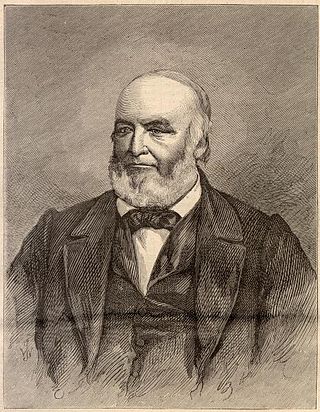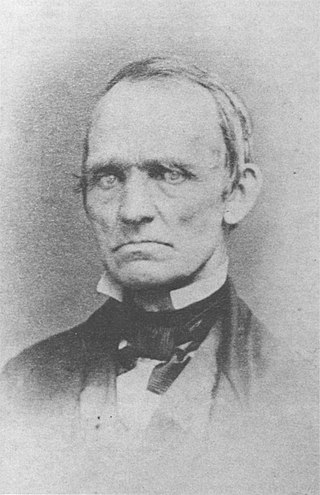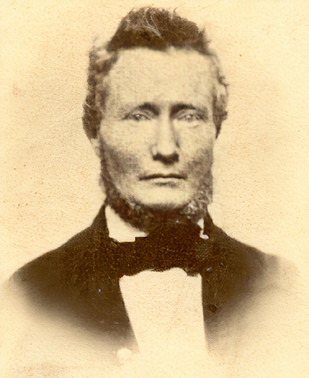Related Research Articles

Walter Quintin Gresham was an American attorney,jurist,statesman,and politician who served in the cabinets of presidents Chester A. Arthur and Grover Cleveland.

John Brough was a War Democrat politician from Ohio. He served as the 26th governor of Ohio during the final years of the American Civil War,dying in office of gangrene shortly after the war concluded.

Coles Bashford was an American lawyer and politician who became the fifth governor of Wisconsin,and one of the founders of the U.S. Republican Party. His one term as governor ended in a bribery scandal that ended in him fleeing Wisconsin,but he was later instrumental in the government of the newly formed Arizona Territory.

William Hendricks was a Democratic-Republican member of the House of Representatives from 1816 to 1822,the third governor of Indiana from 1822 to 1825,and an Anti-Jacksonian member of the U.S. Senate from 1825 to 1837. He led much of his family into politics and founded one of the largest political families in Indiana. He was the uncle of Thomas Andrews Hendricks,who was also Governor of Indiana and Vice President of the United States. Hendricks County was named in his honor. His term as governor was spent repairing the state's finances to later enable large scale internal improvements. The establishment of the basic framework of the state's public school system and the transfer of the capital from Corydon to Indianapolis also occurred during his term.

Samuel Merrill,a native of Peacham,Vermont,was an early lawyer and leading citizen of Indiana,who served as state treasurer from 1822 to 1834. Merrill attended Dartmouth College,and in 1816 settled in Vevay,Indiana,where he established a law practice and served in the Indiana General Assembly as a representative from Switzerland County (1821–22). Merrill resigned his position as state treasurer in 1834 to become the president of the State Bank of Indiana (1834–44);he also served as the president of the Madison and Indianapolis Railroad Company (1844–48) and head of the Merrill Publishing Company,which later became the Bobbs-Merrill Company. In addition to his government service and business ventures,Merrill was the second president of the Indiana Historical Society (1835–48),a founder and trustee of Wabash College,and an elder in the Second Presbyterian and Fourth Presbyterian churches in Indianapolis.

John Coit Spooner was a politician and lawyer from Wisconsin. He served in the United States Senate from 1885 to 1891 and from 1897 to 1907. A Republican,by the 1890s,he was one of the "Big Four" key Republicans who largely controlled the major decisions of the Senate,along with Orville H. Platt of Connecticut,William B. Allison of Iowa,and Nelson W. Aldrich of Rhode Island.

Conrad Baker was an American attorney,military officer,and politician who served as state representative,15th lieutenant governor,and the 15th governor of the U.S. state of Indiana from 1867 to 1873. Baker had served in the Union Army during the American Civil War,rising to the rank of colonel,but resigned following his election as lieutenant governor,during which time he played an important role in overseeing the formation and training of states levies. He served as acting-governor for five months during the illness of Governor Oliver Morton,and was elevated to Governor following Morton's resignation from office. During Baker's full term as governor,he focused primitively on the creation and improvement of institutions to help veterans and their families that had been disaffected by the war. He also championed the post-war federal constitutional amendments,and was able to successfully advocate their acceptance.

Merrill Moores was an American lawyer and politician who served five terms as a U.S. Representative from Indiana from 1915 to 1925.

Stanton Judkins Peelle was an American politician and judge who served as a United States representative from Indiana and both an associate judge and chief justice of the Court of Claims.

Benjamin Parke was an American lawyer,politician,militia officer,businessman,treaty negotiator in the Indiana Territory who also served as a United States federal judge in Indiana after it attained statehood in 1816. Parke was the Indiana Territory's attorney general (1804–1808);a representative to the territory's first general assembly (1805);its first territorial delegate to the United States House of Representatives (1805–1808);one of the five Knox County delegates to the Indiana constitutional convention of 1816;and a territorial court judge (1808–1816). After Indiana attained statehood,Parke served as the first United States District Judge of the United States District Court for the District of Indiana (1817–1835).
Horatio C. Newcomb was an attorney and judge from Indianapolis,Indiana,United States. He also served as the second mayor of Indianapolis.
Byron Kosciusko Elliott was an American lawyer,judge,and jurist from the state of Indiana. Elliott served as the city attorney of Indianapolis,a judge of the Marion County criminal and superior court,and a justice of the Indiana Supreme Court from January 3,1881,to January 2,1893.
Jehu Tindle Elliott was an American lawyer,politician,businessman,and judge who served in the Indiana House of Representatives,the Indiana Senate and as a justice of the Indiana Supreme Court from January 3,1865,to January 3,1871. He also served as the President of the Cincinnati,Logansport &Chicago Railway,securing funding for the construction of a railroad in Central Indiana.

Abram W. Hendricks was an American attorney and politician. He represented Jefferson County,Indiana,in the Indiana House of Representatives for one term and was president of the Indiana State Bar Association.
James McLean Hanna was an American politician,lawyer,and judge from the state of Indiana who served in the Indiana State Senate and as a Justice on the Indiana Supreme Court.
Thomas Wheeler Woollen was an American lawyer,judge,and politician who served as the eleventh Indiana Attorney General from November 6,1878,to November 6,1880.

Francis Triplett Hord Jr. was an American lawyer,politician,and judge who served as the thirteenth Indiana Attorney General from November 6,1882,to November 22,1886.
William Alexander Ketcham was an American lawyer,soldier,and politician who served as the sixteenth Indiana Attorney General from November 22,1894,to November 22,1898. Ketcham also served as Commander-in-Chief of the Grand Army of the Republic from September 24,1920,to September 29,1921.
William Lamborn Taylor was an American lawyer and politician who served as the seventeenth Indiana Attorney General from November 18,1898 to January 1,1903.

Charles W. Miller was an American lawyer,politician,and businessman who served as the eighteenth Indiana Attorney General from January 1,1903,to January 1,1907,and as the U.S. Attorney for the District of Indiana from 1909 to 1913.
References
- 1 2 3 4 5 6 7 8 9 10 Monks, Leander John (1916). Courts and lawyers of Indiana. Indianapolis: Federal Publishing Company.
- ↑ "Secretaries of State". Indiana State Library.
- ↑ "Attorneys General of Indiana". Indiana State Library.
- 1 2 3 4 5 6 7 8 Sulgrove, Berry Robinson (6 Aug 2021). History of Indianapolis and Marion County, Indiana, Volume 1. ISBN 9783849660505.
